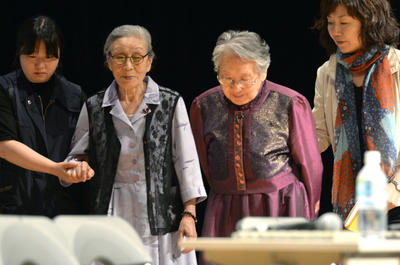Why did Abe do such an about-face?
The Murayama Statement, issued by Japanese Prime Minister Tomiichi Murayama on 15 August 1995, was a clear apology to the victims of Japanese aggression in the war. However, earlier this year Abe began discussing a possible revision of the statement, and in late April he argued that what is labelled ‘aggression’ may be viewed differently depending on what side you are on.
A revision of the statement would have been a departure from the default position on war history taken by all Japanese administrations since 1995. Even Prime Minister Junichiro Koizumi, who was often criticised for his visits to the Yasukuni Shrine, where convicted war criminals are enshrined, never questioned the Murayama Statement. In fact, on several occasions he quoted its key passages, including expressions of ‘heartfelt apologies’ (kokoro kara no owabi) and the use of the word ‘aggression’ (shinryaku). Koizumi quoted from the statement on meaningful occasions too, for example, in 2001 after he visited the Chinese People’s War of Resistance Memorial Hall near the Marco Polo Bridge (Lugouqiao) on the outskirts of Beijing and again in 2005 in front of a large audience during the Asian–African Conference in Bandung, Indonesia. Because Koizumi mixed apologies with visits to the Yasukuni Shrine his behaviour was understood as contradictory.
In contrast, a revision of the Murayama statement by Abe might have led to an unambiguously problematic position, as several of his Cabinet have visited Yasukuni since the LDP was sworn in.
On Monday 13 May, Osaka Mayor Toru Hashimoto made provocative remarks that arguably forced Abe into the open on the Murayama Statement. According to Hashimoto, the ‘comfort women’ system was ‘necessary’ to ‘provide rest’ to soldiers ‘risking their lives’. Hashimoto also said American soldiers should use the adult entertainment industry to a greater extent to smother their sexual desires. Even though Hashimoto’s colleagues within his party basically supported the comments, the remarks were severely criticised not only outside but also within Japan.
All the major Japanese newspapers ran editorials condemning the remarks. The Mainichi Shimbun argued the comments lacked ‘consideration for women’s human rights’. The Asahi Shimbun censured Hashimoto for ‘pouring salt in the former comfort women’s wounds’ and for ‘insulting women living today as well as American soldiers’. The conservative newspapers, Yomiuri Shimbun and Sankei Shimbun, both strongly criticised the remarks as an affront to women’s dignity. That the remarks were understood in the context of human rights and not only as representing a certain view of history probably contributed to this broad condemnation of the comments. It is likely that American disapproval contributed as well.
The ruling Liberal Democratic Party (LDP) distanced itself from Hashimoto’s statement. Tomomi Inaba, the minister in charge of administrative reform, said ‘the system of comfort women is a violation of women’s human rights’ and the Asahi Shimbun suggested that the LDP might need to abandon its idea of cooperating with Hashimoto’s Japan Restoration Party after the July upper house election. In addition, Natsuo Yamaguchi, leader of the New Komeito, which forms a coalition government in the Osaka municipal assembly with Hashimoto’s local group, condemned the Japan Restoration Party: ‘The good sense of voters will flatly reject a party with these kinds of leaders’. Opinion polls suggest that Yamaguchi was correct and previous ally Your Party has abandoned plans to cooperate with the Japan Restoration Party in the upcoming election. Even though Hashimoto has since retracted some of his previous comments and argued that parts of what he said was misreported, the episode has generated a severe crisis for his party. But the most significant outcome of the episode is probably that Prime Minister Abe has expressed full support for the Murayama Statement. That Abe’s endorsement came immediately after strong criticism of Hashimoto’s remarks was not a coincidence.
Hashimoto’s comments put the spotlight on Abe’s own recent statements and made it necessary for Abe to distance himself and the LDP from overtly inflammatory opinions on the war. For one thing, Abe is trying to gain support from the international community for Japan’s position on the Diaoyu/Senkaku Islands, and insensitive comments on war-related issues will not help Japan’s case. Hashimoto’s comments appear to have made this increasingly clear to Abe.
The problem with provocative Japanese opinions concerning the war is not so much that they enjoy support but rather that they do not attract vocal opposition. Abe became prime minister despite, not because of, his controversial views on war history — voters are primarily concerned with issues that influence their economic wellbeing, not nationalism. It is too early to say whether the strong reaction to Hashimoto’s statement will lead to stronger and more vocal domestic opposition to insensitivity concerning Japanese wartime aggression. Nonetheless, the reaction to Hashimoto’s statement offers an opportunity to strengthen resistance to such opinions and clearly define the boundaries for acceptable public discussion.
Karl Gustafsson is a Postdoctoral Fellow at Lund University, Sweden.

